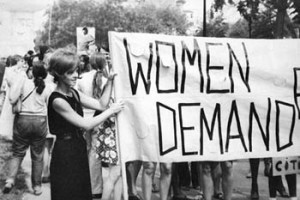By Paul Elam
Men are only as mentally and emotionally healthy as their ability to say no to a woman. Actually, that bears repeating.
Men are only as mentally and emotionally healthy as their ability to say no to a woman.
Obviously, this does not apply in some areas. Mental health problems won’t be solved by simply finding a woman and uttering the word “no.” Gay men may have a somewhat different perspective about this but they are raised with the same life expectations as straight men so there is no real pass for them either. Quite the contrary.
Still, I will hold to this proposition and do my best to explain it. I can tell a great deal about a man, his boundaries, his values and ultimately his integrity and character with a simple measurement of his obsequiousness with and deference to women.
Romantic Chivalry
To understand all this requires a bit of a history lesson, dating back to the twelfth century and the cultural movement driven by romantic chivalry.
At precisely that moment in history the warrior code was harnessed to the emerging culture of courtly love, an aristocratic invention that saw the military principles of honor, gallantry and service placed in the service of a new Commanders in Chief – courtly ladies.
As historian Jennifer G. Wollock summarizes, “The idea that love is ennobling and necessary for the education of a knight comes out of the lyrics of this period but also in the romances of knighthood. Here the truest lovers are now the best knights.”1
While there is arguable evidence that protection of women and children is a basic male instinct, tied to reproductive access, this is likely the first known time in history where that mandate was codified.
Over a period of a few hundred years, romantic chivalry spread to all the principle courts of Europe and found its way more broadly to lives of everyday men and women who coveted the lifestyle of the upper class. It also fostered a great deal of female privilege and the inescapable neoteny that came with it.
So went the first known institutionalization of pressuring men into a tradition of male servitude – or obsequiousness – toward women that continues unchecked today. Yet it was only the first of three foundational events that would become the prevailing model of gender relations; one that negatively impacts men’s lives and mental health.
The Industrial Revolution
 The next developmental watershed in men’s deference to women was the Industrial Revolution. While thrusting humanity into modern civilization, it was the next giant step toward normalizing a standard of mental illness in men where it concerned their relationships with women.
The next developmental watershed in men’s deference to women was the Industrial Revolution. While thrusting humanity into modern civilization, it was the next giant step toward normalizing a standard of mental illness in men where it concerned their relationships with women.
Prior to the Industrial Revolution, men largely worked in or near their homes. They worked as artisans, farmers, producers of livestock, tradesman or some other profession that they passed down to their sons through apprenticeship and mentoring.
While still driven by the force of romantic chivalry, they were as involved in the raising of children as mothers were. Those mothers, by the way, also had laborious duties that were a regular part of their role in the family. With the combined work of both parents and participation of the children, families operated more like business concerns than what you most commonly see today.
Both discipline and nurturing from both parents were immediately present; both male and female influence in the lives of children.
The Industrial Revolution, combined with romantic chivalry, accelerated the problem. The mass migration to cities began. Fathers were removed from the home (and the daily lives of their children) to go into factories and work. And of course one of the first products of that revolution was advanced technology in the home, making the lives of women much safer and less arduous. It also created a lot more free time for women, arguably time for them to become fixated on their emotional needs.
The impact of that on family dynamics hit like a tsunami. Women were left to the increasingly softening work of home and children alone, and left in want of adult company. Husbands returning from long, grueling days of labor returned home to be fed and to rest, without the luxury of making up time they had missed with their families.
In this familial void, women quickly turned to their children, particularly male children, to fill their emotional needs. And fathers, consumed by work and duty, largely just enforced the wishes of the mother on the children. This triggered the second wave of privilege and psychological neoteny in western women and where men, due to resentment over their absence, began to be demonized.
Oedipal Culture
All of this greatly increased the likelihood that mothers would form inappropriate bonds with their male children in order to fill the holes in their lives. In other words, we took a step toward a society of emotional incest.
This is difficult to understate. What I am defining here is a culture of emotionally incestuous bonding between mothers and sons. The implications of that are tremendous, and in fact they seem to have been verified by the following 150 years of technological advancement and cultural malaise.
Perhaps it is not coincidental that the onset of the industrial revolution also saw the first formations of what were known to be “Henpecked Husbands” clubs; groups of men who gathered to use peer pressure to induce each other into tolerating more demands and abuse from their wives.
 The Industrial Revolution gave birth to a new age in civilization. It also ultimately resulted in the breakdown of the family unit as it was once known. The late nineteenth century rang in the Tender Years Doctrine, and with it the first legal presumption that younger children were better off in the care of mothers than fathers. The steamroller did not stop from there, it accelerated. The same glut of time and resources that spawned women to create an emotionally incestuous culture also produced gender feminism, the last and final of a monumentally powerful triad of events that left the majority of men in seemingly helpless servitude to women.
The Industrial Revolution gave birth to a new age in civilization. It also ultimately resulted in the breakdown of the family unit as it was once known. The late nineteenth century rang in the Tender Years Doctrine, and with it the first legal presumption that younger children were better off in the care of mothers than fathers. The steamroller did not stop from there, it accelerated. The same glut of time and resources that spawned women to create an emotionally incestuous culture also produced gender feminism, the last and final of a monumentally powerful triad of events that left the majority of men in seemingly helpless servitude to women.
Barely one and a half centuries from the first American factory being built and our culture is all but dominated by a woman-first mentality. So rote and mindless have men become that they allow single mothers to effortlessly continue the spread of emotional incest and other forms of child abuse.
Our boys enter an education system completely dominated by female teachers, all of whom are a product of the same forces that created the new paradigm.
Society, especially the female dominated realms of home and early education, produces males that are highly, often terminally dependent on female approval. By the time boys get more substantial exposure to males, the pattern is set. Not to mention the fact that the males they are exposed to are as dependent on female approval as those who might otherwise provide mentoring. They too, as beta enforcers, put pressure on boys to participate in the incestuous bond as expressed in the schools.
This puts us squarely in an age of crippled masculine identity and the consequential impotence. We have legions of men who have stood by silently while their families have been destroyed in corrupt courts, where our young men are being driven out of education and into fields of combat and where men are more likely to support and enable these travesties than to object to them.
Their silence is the mental health issue of our time and you can see it reflected most clearly in men’s interpersonal relationships with women.
When I co-wrote “Say Goodbye to Crazy,” a book aimed at women who were dealing with the devastation wrought in their relationships by mentally unstable and abusive ex-wives, a substantial part of the focus was directed at husbands who lacked the ability to stand up to their former partners.
That problem is not contained to the second marriages of a handful of men. It is a sweeping societal problem that affects all men.
If you read my last article about male space, you will know that when I gave men in a treatment setting the task of focusing on themselves vs focusing on the women in that community, the immediate reaction was fear. That fear was proven justified when the men and women, both staff and clients of that facility, reacted in anger to the men putting themselves first for a single weekend.
What was also proven was the dire need for men to overcome overwhelming programming and pressure.
With a catastrophic gender suicide gap and a plethora of other problems affecting men, at the root of it is men’s programming to sacrifice their interests, well-being and their boundaries in order to take care of and please women.
They have lost the ability to say no. Indeed they have never had it. They are terrified of the loss implied by the very thought of it. The fact that we have done away with all of our rituals to transition boys into manhood does not help but that will be a topic for a future essay.
Changing Course
Correcting this, reversing the trend, is easier said than done. In fact, it is damned hard work for most, and simply undoable for the many who lack the strength to face and walk through fear on such a primal level. It can, however, be accomplished in stages for the dedicated.
The first stage is Simple Awareness and is by far the easiest. It is just education and can be had as easily as grasping the contents of this writing. When men understand the forces that compel them to please women at any cost, they create the opportunity and motivation to imagine it can be corrected. With that, they can rewrite their future, largely by rewriting their history. More to come on that as well.
The second stage is brutal. There is no other way to put it. It requires men to face the fear of ripping the emotionally incestuous bond; the foundational fear of all men, the fear that most resembles the fear of death. It means putting themselves in the jaws of the beast from which they have to scratch and claw their way out.
Once they have emerged they reach the final and unending stage of walking in the footsteps that were determined by a newly shaped history, sans the Romantic Chivalry, sans the emotional incest and sans the gynocentrism.
I realize that the definitions of these stages are cursory and incomplete. There is much more to them. A more thorough examination is next in this series of essays intended to help men free themselves and their sons from the clutches of a path that was chosen for them in favor of a path that they carve out for themselves.
[1] Jennifer G. Wollock, Rethinking Chivalry and Courtly Love, (Published by Praeger, 2011)
This article was first published at An Ear for Men and republished with permission.